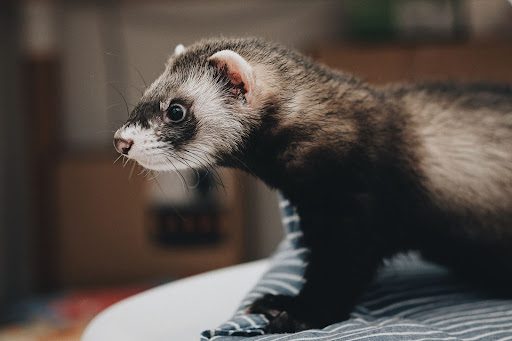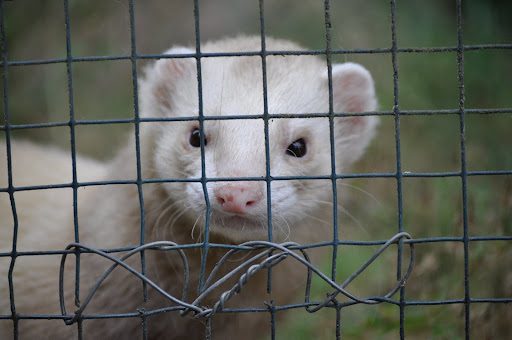
- 1 year health guarantee for all our exotic pets on sale
- [email protected]
Ferrets belong to the weasel family and are a form of domesticated European polecats. They have been domesticated for more than 2,000 years.
Ferrets are also popular as pets and can be adorable at times. They may be small animals, but they require good care, just as much as a dog or cat.
Here is a guide on ferret care. It covers everything you need to know about caring for these adorable animals.

Ferrets are fun-loving animals that serve as great pets. They are part of the Mustelidae family, to which weasels, otters, and badgers belong.
For a long time, ferrets have been commonly used for pest control at homes and hunting. However, today, they are more popular as household pets than anything else.
Ferrets have an average lifespan of 5-7 years. However, a ferret that lived for 14 years holds the record for the oldest ferret to have ever lived.
Ferrets are very social animals, so adopting a pair together is recommended so they won’t feel lonely.
Male ferrets are known as hobs, while females are known as jills. Baby ferrets are called kits. The males are larger than the females. They also have a strong, pungent smell if they haven’t been neutered.
Taking care of a ferret needs some work on the owner’s part, just as much as caring for cats and dogs.
Here are a few tips on what you need to know about taking care of a ferret.
Ferrets are obligate carnivores, similar to cats. They require meat to be a part of their diet. A ferret’s diet must include a high level of fats because it’s the primary source of calories for these animals. Its diet should also be rich in highly digestible meat-based protein.
A plant-based diet is insufficient for ferrets and could lead to health issues like poor growth, bladder stones, GI disease, and skin diseases. You should also avoid feeding ferrets a high level of grains as they can’t digest fiber.
Ferrets should have continuous access to fresh water. Make sure the water is changed regularly.
Ferrets are naturally clean animals, but they do emit a musky odor. No matter how well you bathe your ferret, the scent never completely disappears. The smell is more prominent in ferrets that have not been neutered.
You should bathe your ferret only once or twice a month. It’s because bathing will strip its coat and skin of natural oils responsible for the musky odor.
However, over-bathing will cause the body to overcompensate and produce more of these oils, worsening the odor.
Use pet-friendly shampoo and warm water to bathe your ferret.

The ideal size of a ferret cage should be 18 X 18 X 30 inches. It should also have stairs or ramps that ferrets can climb. Wire cages are ideal for these animals.
Cover the cage floor with linoleum flooring or washable carpet, as the wires can hurt the ferret’s tiny feet. Avoid using wood or newspaper as these are difficult to disinfect and may turn their feet black.
Provide a hammock or shelves for your ferret to perch on. It also needs a dark enclosure where it can nest in.
Ferrets should be kept in a cool, shady area as they must be kept away from the sun. A temperature above 27 degrees Celsius is not ideal for ferrets, so direct a fan to its cage.
Ferrets have various health issues, just like any other pet. Therefore, these animals should also be taken to the vet for regular examinations.
You should take your ferret for annual check-ups until it’s five years old, once every six months.
Keep up-to-date on your ferret’s vaccinations and treat it with a monthly preventative if it’s at a high risk for fleas.
Ferrets should be neutered before they reach sexual maturity, which is usually between 6 and 12 months.
You should also clean your ferret’s ears regularly every two weeks to a month, as they could get waxy quickly.
Some common diseases in ferrets include adrenal disease, human influence, skin tumors, pancreatic cancer, other cancers, and heart disease.
Taking your ferret to the vet regularly will help keep its health in check to ensure it’s not suffering from these diseases.
Here are a few other tips to consider when caring for your ferret.
Ferrets are curious, fun-loving, and social animals, making them ideal pets. Ferrets see humans as great companions and tend to form a strong bond with them. Their charming nature makes them even more suitable as household pets.
Ferrets may be challenging to handle and could even bite hard if startled. They are probably not the best pets if small children are in the household.
As these are good pets, why not get a healthy and trained ferret for you? Find the best one here.
Ferrets are some of the most adorable pets to have and have a very charming nature that keeps humans attracted to them.
Caring for a ferret is similar to caring for any other pet, like dogs and cats. Keeping your ferret’s health in check is essential by taking it to the vet regularly.
Ensure to provide your ferret a cage with adequate space that is enough for it to live, exercise, and do everything else that it needs comfortably.
Ferrets require a meat-based diet, and feeding them a plant-based diet could adversely affect their health.
Ferrets are high-maintenance animals that must be kept in a cage when unsupervised. They are similar to dogs in a small package and require much attention from their owners.
Ferrets love their owners and are very loyal to them. They are very social animals curious to observe people and objects.
Ferrets are very trainable, similar to training a cat, only if you have the patience. However, ferrets do not naturally use the litter box like cats do, so most people need to correct the mistake when training them.
Copyright © 2024 Compound Exotics All Rights Reserved.